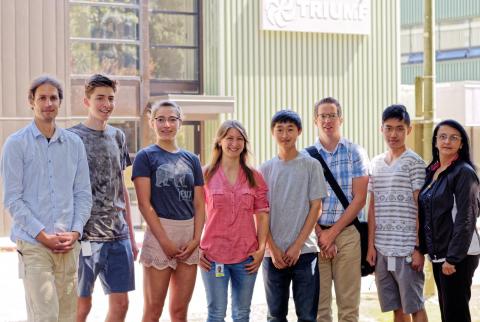
The TRIUMF High School Fellowships are for graduated high school students in British Columbia entering their first undergraduate year at an accredited university or college. The Fellowship offers a $3000 award and a six-week research experience to each of the students over July and August. One of this year's fellows was co-sponsored by the Canadian Society of Senior Engineers (CSSE) through the C. Gordon Lindsay Memorial Award. The program aims to launch the physics and engineering careers of these brilliant young students who have clearly demonstrated a passion for research.
Meet Micah Gay
Supervisor - Dr. Chris Ruiz
Micah just graduated from the Prince of Wales Mini School and will be starting her first year at Columbia University as a Rabi Scholar pursuing a degree in Physics and Mathematics. She works under the supervision of Dr. Chris Ruiz on DRAGON, which is a recoil mass spectrometer that simulates and measures properties of nucleosynthesis (fusion) reactions that occur in stars. Physics has always been something she’s loved because it provides a framework to answer her stream of questions about how the universe works at its most intrinsic level.
She hopes to someday become a researcher in one of the fundamental fields of physics. If she had to be an elementary particle she would be a gluon so that she can get the “oddly delightful feeling of looking down at a physicist as they finish the last of their drink - the strange charm of a top-down bottoms up”.

Meet Robert Lee
Supervisor - Dr. Doug Schouten
As a recent graduate of Oak Bay High School on Vancouver Island, Robert will be attending the University of Victoria this September as an engineering student. At TRIUMF, he’s working under the supervision of Dr. Doug Schouten (AAPS) on a detector for fast neutrons generated during nuclear fusion experiments. As neutrons enter the scintillator bar on the detector, flashes of light are gathered and transmitted via an optical fibre to a photon counter. This signal is displayed on an oscilloscope and counted by a computer program to measure the sensitivity of the bar under different light conditions.
Robert sees the TRIUMF High School Fellowship as an opportunity to explore his passion for physics, which bloomed during his high school career. As one of the Fellowship recipients, he’s had the chance to apply his high school physics knowledge in the real world under the guidance of “inspiring researchers in a world class laboratory.” If he had to be an elementary particle he would be a Higgs boson.

Meet Jake Hauser
Supervisor - Dr. Ruediger Picker
Jake graduated from St. George’s School in Vancouver and will be attending Pomona College in California. His first steps towards physics came from reading a biography of Richard Feynman in grade seven. At TRIUMF, he works under the supervision of Dr. Ruediger Picker on the Ultra Cold Neutron (UCN) project. The UCN Project uses a proton beam to produce neutrons from a tungsten source and slows them to ultra-cold speeds. The goal is to measure the electric dipole moments of these neutrons.
Jake says the best thing about being one of the TRIUMF Fellowship recipients is “being surrounded by interesting projects, people, conversation, and lectures.” For him, everything he does at TRIUMF is an opportunity to learn. Ideally, he wants to make a worthwhile impact in some field. If Jake were a fundamental particle he’d be a charm quark.

Meet Ray Lui
Supervisor – Aurelia Laxdal
Ray graduated from R.C. Palmer High School in Richmond a few months ago and will be pursuing an Applied Science (Engineering) degree at UBC in September. He’s always had a passion for engineering and creating, and being awarded the TRIUMF Fellowship was the perfect way to apply his skills and contribute to the national endeavour that is TRIUMF's research program. For his amazing engineering acumen he was awarded the CSSE C. Gordon Lindsay Award.
Ray works on target module 3 in ISAC II under the supervision of Aurelia Laxdal, P.Eng. Part of his work requires him to do thermal analysis on how hot the ground electrodes of the target module get when the water cooling line is removed. The water cooling line obstructs the overall functionality of the experiment so his job is to figure out how to remove the water cooling line and still have the experiment run as effectively as it can.
In addition to his TRIUMF experience he plans to pursue a start up technology company – he hopes to “be the next Elon Musk some day.” Ray cannot stand negativity, so if he were a fundamental particle he would be a positron.

